by Katherine Norris | Apr 9, 2020 | Academics, Careers In..., City of Abilene, Current Students, Student Spotlights, Uncategorized
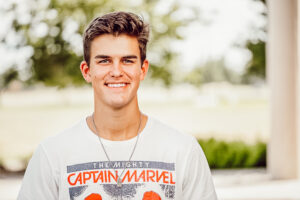 Graham Cepica (’21) is a marketing major from Lubbock, TX. Graham recently began an internship with New York real estate developer, Horacio LeDon, where he has been able to receive real-world experience that he can translate to the classroom and his professional career development. When it comes to internships and job searches, networking often plays a vital role in finding the opportunities that will provide the most valuable experience. Initiative, interest, and passion also play a large role in obtaining such opportunities. Graham is a wonderful example of how networking brought him to a once in a lifetime internship opening.
Graham Cepica (’21) is a marketing major from Lubbock, TX. Graham recently began an internship with New York real estate developer, Horacio LeDon, where he has been able to receive real-world experience that he can translate to the classroom and his professional career development. When it comes to internships and job searches, networking often plays a vital role in finding the opportunities that will provide the most valuable experience. Initiative, interest, and passion also play a large role in obtaining such opportunities. Graham is a wonderful example of how networking brought him to a once in a lifetime internship opening.
“Last semester, I had the chance to attend the Abilene Young Professionals Summit. In one of the breakout sessions, a local entrepreneur and real estate developer named Tim Smith was speaking. After the panel, I introduced myself to him and got his information. It wasn’t long before I was spending my days downtown shadowing Tim, meeting people, and learning about the exciting developments in store for Abilene. Towards the end of the semester, I approached Tim about a possible internship for the coming spring. Even though he could use a hand with his projects in south downtown, he suggested a better alternative. Tim introduced me to a man by the name of Horacio LeDon, a prominent real estate developer from New York that was a fellow investor in the purchase of the Windsor Hotel. Horacio was the lead developer for the renovation and revitalization of the historic building and was willing to take me on as his intern. Tim recognized that this project would be a once-in-a-lifetime opportunity for me, and the experience has been nothing short of exactly that.”
“I would go to my internship every weekday after I got out of class. A typical day looks like me meeting Horacio after lunch and updating him on any upcoming meetings that I have set up for us with different vendors and partners. For example, Abilene companies that sell flags that we want to extend from the balcony, potential businesses that we are interested in for the retail spaces connected to the lobby, interviews with local CPA’s to serve as part-time CFO’s, interior designers that can come alongside us in the project, architects, lighting designers, security services, etc. In addition to meetings, I organize floorplans, inspiration, official documents, and agendas into their corresponding files. Horacio and I have various shared photo albums with inspiration for the Windsor, as well as shared Notes with to-do lists. Sometimes, Horacio has his own meetings that I get to shadow. I have gotten to meet the city manager, chairman of the city council, and others by way of Horacio’s network. Horacio is always mindful of providing me with valuable experience and learning opportunities. The relationship I have with Horacio has been my favorite part of the internship. Due to a mutual respect for one another, we have developed an efficient working environment allowing me to serve the team and be part of a special development for downtown Abilene.”
This project has fueled a desire in Graham to further explore careers in real estate and real estate development. “I am intrigued by the creativity that real estate development presents. The ability to see something with potential and add value to it is something that I have a passion for. I would love to bring this passion into my career – whether I am adding value to a building, a project, or a team of people. But right now, my next best step is to ‘add value’ to this internship with the service I provide.”
The College of Business Administration seeks to provide all students with internship and job search help, professional development coaching, as well as helping students expand their professional network. Graham Cepica is definitely a testament to the power of networking, saying, “The networking opportunities at ACU had a domino effect that led me from one person to the next.”
Interested in learning more about professional development at ACU? Click here to learn more about the Professional Development program offered by COBA. Click here to learn more about ACU’s Career Center.
by Maddy Crockett | Apr 4, 2020 | Academics, City of Abilene, Current Students, Student Spotlights
(Maddy Crockett, sophomore accounting major from Lubbock, Texas shares her experience of living in Oxford, England with ACU’s Study Abroad program this spring and what it was like when they were forced to return home due to the Coronavirus.)
Heartbroken – the moment we’d been dreading had come. We looked around at each other as they announced over the loud speaker on the bus that the Oxford program was forced to shut down. We were going home two months earlier than expected. President Trump had addressed the nation the night before, raising the travel restriction levels all throughout Europe, except for the UK. The other students in Leipzig were out of Germany when the news came, and they left immediately – without their belongings and without saying goodbye. The prospect of the Coronavirus interfering with our semester had been a topic of debate between the students for several weeks, but we were optimistic until the end. After that day, though, we began the dreaded process of saying goodbye.
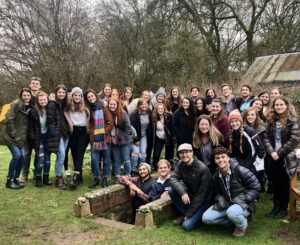 Before I studied abroad, I might not have taken seriously how deeply one connects to the place they live. “Yes, they have to come home. So what? They just spent the last two months travelling and spending money. Surely it couldn’t have made that big of an impact, right?” And sadly, I make these assumptions for many activities I have no experience in. Yet, the past two months, while seemingly short, truly were life changing, and my heart ached at the prospect of leaving early and departing from that environment.
Before I studied abroad, I might not have taken seriously how deeply one connects to the place they live. “Yes, they have to come home. So what? They just spent the last two months travelling and spending money. Surely it couldn’t have made that big of an impact, right?” And sadly, I make these assumptions for many activities I have no experience in. Yet, the past two months, while seemingly short, truly were life changing, and my heart ached at the prospect of leaving early and departing from that environment.
I really had no plans to study abroad. A friend convinced me to sign up freshman year, and thinking it would be a good way to push myself, I said yes and submitted my application. Yet, as the drop date steadily approached, I went back and forth, struggling over if it was something I truly wanted to commit to. Did I want to be gone for a whole semester? Would I regret the activities and people I’m missing on campus? What if I got over there and hated it? Was it even worth it? After almost backing out – twice, I might add – I decided to go through with it, and that was that. Fall semester flew by and Christmas break arrived, which led to packing, planning, and saying goodbye to friends and family in Texas.
 The day we left for Oxford – a Wednesday morning after spring semester had started – we were teary-eyed and unsure what the next four months held. I had two close friends going abroad with me and others who I hoped to know better, but I was leaving many dear friends at ACU. ‘Why on earth am I leaving when I have so many good things right here?’ I thought as we all hugged each other goodbye. Then, we were whisked away on the bus, took several long flights, and arrived exhausted and unsure the next day in the city of Oxford. It was cloudy, cold, and completely foreign.
The day we left for Oxford – a Wednesday morning after spring semester had started – we were teary-eyed and unsure what the next four months held. I had two close friends going abroad with me and others who I hoped to know better, but I was leaving many dear friends at ACU. ‘Why on earth am I leaving when I have so many good things right here?’ I thought as we all hugged each other goodbye. Then, we were whisked away on the bus, took several long flights, and arrived exhausted and unsure the next day in the city of Oxford. It was cloudy, cold, and completely foreign.
The next few days held room assignments, walking tours, scavenger hunts, and exploration as we settled into our new environment. The cloudiness and cold slowly shifted to cozy and ideal; the foreign turned into curiosity and adventure. We found bakeries with beautifully decorated cakes, coffee shops with upstairs seating and rickety wooden floors, the grocery store to load up on a few days’ worth of groceries (and no more than that — it’s a mile walk home, and you carry what you buy). We began our classes in a little establishment off of Woodstock Road – The Quaker Meeting House – and got plugged into a church that many study abroad alums told us about, St. Aldates. We went running through the abundant parks and meadows Oxford holds, and we grew accustomed to walking at least a mile to get places. The days faded into weeks, and without even realizing it, I had forgotten to be nervous or to miss home. This adventure had captured my attention, and each new day brought eagerness and excitement – a rhythm was found.
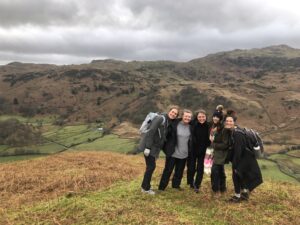 While a foreign country itself is an incredible journey, it wouldn’t have been half of what it was without the people I experienced it with. Oxford holds the largest ACU group, with thirty-five students, two professors, and an on-site director, but it never hindered us from learning to know one another. These were people we saw day in, day out, from breakfast to class, to the common rooms and everywhere in between. We were all on the same schedule, all in a new place, and all wanting to make the most of our time here – which is the perfect environment for connection. Not only did I grow closer to the friends I already had, but our community grew abundantly as we created one-of-a-kind shared experiences with each other. Class devotionals on Monday nights, breakfast for dinner with a smaller group, college night at church (and going for ice cream once it ended), and eventually, travelling to different countries in our free weekends. An environment affect change so much in a person, but the people there with you make all of the difference.
While a foreign country itself is an incredible journey, it wouldn’t have been half of what it was without the people I experienced it with. Oxford holds the largest ACU group, with thirty-five students, two professors, and an on-site director, but it never hindered us from learning to know one another. These were people we saw day in, day out, from breakfast to class, to the common rooms and everywhere in between. We were all on the same schedule, all in a new place, and all wanting to make the most of our time here – which is the perfect environment for connection. Not only did I grow closer to the friends I already had, but our community grew abundantly as we created one-of-a-kind shared experiences with each other. Class devotionals on Monday nights, breakfast for dinner with a smaller group, college night at church (and going for ice cream once it ended), and eventually, travelling to different countries in our free weekends. An environment affect change so much in a person, but the people there with you make all of the difference.
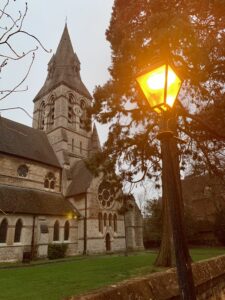 It would be impossible to convey everything I learned or experienced in Oxford, but there are a few that stick out to me. Something I have noticed since being at home is that study abroad gives students the opportunity to step back from their commitments, their activities, the people they spend time with, and really see who they are outside of that. It can help you think about what’s important to you back home, and what you want the rest of your college career to look like. For me, these past two months helped me grow in proactivity and confidence. Whether it be volunteering to plan out all the details of our next trip, using Apple maps to navigate us through the streets of a city, or choosing excitement instead of intimidation when countless opportunities present themselves, the experiences I had helped make me a little more well-rounded (I hope, at least!).
It would be impossible to convey everything I learned or experienced in Oxford, but there are a few that stick out to me. Something I have noticed since being at home is that study abroad gives students the opportunity to step back from their commitments, their activities, the people they spend time with, and really see who they are outside of that. It can help you think about what’s important to you back home, and what you want the rest of your college career to look like. For me, these past two months helped me grow in proactivity and confidence. Whether it be volunteering to plan out all the details of our next trip, using Apple maps to navigate us through the streets of a city, or choosing excitement instead of intimidation when countless opportunities present themselves, the experiences I had helped make me a little more well-rounded (I hope, at least!).
The Coronavirus had been a topic of discussion, first jokingly back in February, then more seriously as other universities began to pull their programs. To us, it was something in China, then in Italy — but not Oxford, not where we were. The week before we left, our class was scheduled for a trip to Northern Spain. We were elated because we would all be together to explore that new 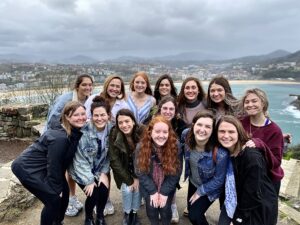 place. As we packed and prepared to leave for it, we heard about more and more programs that were being called back home and that the numbers of the sick in Italy were growing exponentially. There was debate if we would be pulled, too, but the ACU Study Abroad office continually communicated with us that our program would continue as planned, as long as our area was safe and that the US deemed it so. Looking back, our time all together in Spain was one of the high points of our semester, and we could not have ended on a better note.
place. As we packed and prepared to leave for it, we heard about more and more programs that were being called back home and that the numbers of the sick in Italy were growing exponentially. There was debate if we would be pulled, too, but the ACU Study Abroad office continually communicated with us that our program would continue as planned, as long as our area was safe and that the US deemed it so. Looking back, our time all together in Spain was one of the high points of our semester, and we could not have ended on a better note.
When we learned that we were going home early, we were blessed to have two whole days left to say goodbye to our temporary home. Souvenirs were bought, scones and pastries were consumed in unhealthy quantities, we had one last breakfast for dinner, and we ran through the parks and meadows that were slowly greeting spring. The last day held flurried packing, tearful conversations, and a bus ride to the airport that came all too soon. I thought back to that first bus ride, where I questioned why on earth I was wanting to do this. Now, I never wanted to leave. Life can be funny that way.
 As I sit here at home, saddened by what these next two months could have held in Oxford, but even more so by the devastation and chaos that the Coronavirus has brought upon everyone, I am still grateful. Friends and family reaching out to see how we are holding up, class Zoom calls that feel a little more like reunions, a virtual breakfast for dinner, and time to sit and dwell on what the Lord has done in us since we left the US back in January. Study Abroad gave me the dearest friends, an abundant atmosphere and culture, and instilled a drive in me to go after and get done ideas that I have. I am so incredibly grateful for this opportunity, in the midst of its interruption, and I am curious to see what the rest of this year will look like. Still, I am eager for the day when I can return again to visit this temporary home.
As I sit here at home, saddened by what these next two months could have held in Oxford, but even more so by the devastation and chaos that the Coronavirus has brought upon everyone, I am still grateful. Friends and family reaching out to see how we are holding up, class Zoom calls that feel a little more like reunions, a virtual breakfast for dinner, and time to sit and dwell on what the Lord has done in us since we left the US back in January. Study Abroad gave me the dearest friends, an abundant atmosphere and culture, and instilled a drive in me to go after and get done ideas that I have. I am so incredibly grateful for this opportunity, in the midst of its interruption, and I am curious to see what the rest of this year will look like. Still, I am eager for the day when I can return again to visit this temporary home.
by Katherine Norris | Feb 27, 2020 | Academics, Accounting, COBA Faculty, Uncategorized
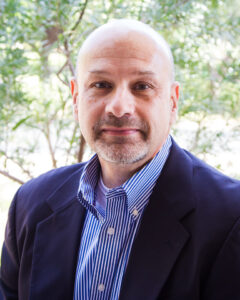
Dr. Curtis Clements
Efficiency is the key to accounting and the current key to efficiency is analytics. As the field of accounting advances and changes, so does the software, and therefore, the subjects taught in the accounting major. Dr. Curtis Clements saw the need for a course in accounting analytics and began teaching Audit Analytics, a graduate level class, last fall.
He explained that, historically, accounting has determined accuracy of financial statements by utilizing sampling. However, with programs like Tableau, Alteryx, Excel, etc., it has become possible to obtain, clean, and analyze data much more accurately and precisely. With the business world transitioning quickly into the world of analytics, Dr. Clements found it important to provide an opportunity for students to gain experience in one of the emerging disciplines and most crucial parts of accounting.
That goal was certainly met. The class was given access to Dillard’s department store sales data (housed at the University of Arkansas). This gave the students a real world feel to analyzing and working with large data sets. Dr. Clements wanted the class structure to give information and tools that would be practical in the future for each student’s career. The positive feedback give by students for the class led to an upgrade to the course textbook, which will lead to more information learned to put into action in the workplace.
Anthony Rodriguez, Master of Accountancy major from Argyle, Texas, participated in the inaugural class and  gave his seal of approval. “I really enjoyed the class. This past summer, during my internship at EY, I was selected as 1 of 60 interns nationwide to go to Hoboken, New Jersey to attend a training in auditing analytics. The software packages we were taught in training were Tableau and Alteryx. One of the things I took from the training was how much technology can impact an audit for the better. Also, as 1 of only 60 interns, I would have an advantage over some of my peers. The Audit Analytics course at ACU touched on some of those same topics- specifically Tableau. As the course went along, I realized that we were learning much of the same material Ernst & Young (EY) had deemed a worthy investment. From my short experience in New Jersey, I saw how technology will begin impacting how audits work. Clearly, if EY invested as much money as they did to develop their Digital Ambassador Intern Program, it seems as though the Big 4 accounting firms want to get a head start on this trend. It is really awesome that COBA and Dr. Clements have begun offering this course to ACU students. Our careers will only get more and more digital, so it’s great that ACU is offering this course to help set its students apart from the competition.”
gave his seal of approval. “I really enjoyed the class. This past summer, during my internship at EY, I was selected as 1 of 60 interns nationwide to go to Hoboken, New Jersey to attend a training in auditing analytics. The software packages we were taught in training were Tableau and Alteryx. One of the things I took from the training was how much technology can impact an audit for the better. Also, as 1 of only 60 interns, I would have an advantage over some of my peers. The Audit Analytics course at ACU touched on some of those same topics- specifically Tableau. As the course went along, I realized that we were learning much of the same material Ernst & Young (EY) had deemed a worthy investment. From my short experience in New Jersey, I saw how technology will begin impacting how audits work. Clearly, if EY invested as much money as they did to develop their Digital Ambassador Intern Program, it seems as though the Big 4 accounting firms want to get a head start on this trend. It is really awesome that COBA and Dr. Clements have begun offering this course to ACU students. Our careers will only get more and more digital, so it’s great that ACU is offering this course to help set its students apart from the competition.”
Audit Analytics was a resounding success and Dr. Clements is working to make sure the class will continue improving and adjusting to meet the demands of the field in the future as the tools for accounting analytics advance. The Master of Accountancy program prepares accounting students to meet the demands of the field, in whatever type of firm or accounting career they seek to work in. Click here to learn more about ACU’s Master of Accountancy program.
by Katherine Norris | Feb 20, 2020 | Academics, Accounting, City of Abilene, Current Students, Faith Infusion, Outcomes, Social Entrepreneurship, Student Spotlights
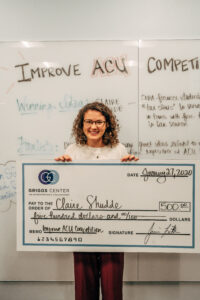
Claire Shudde
On January 27th, senior chemistry major Claire Shudde entered the Improve ACU Competition and left with a cash prize of $500 and the opportunity to make her idea come to life. The competition was co-hosted by the ACU Student Government Association (SGA) and the Griggs Center for Entrepreneurship and Philanthropy.
Mindy Howard, the Student Engagement Coordinator for the Griggs Center for Entrepreneurship and Philanthropy explained why they chose to create this competition. “We wanted to try and reach a larger sector of the student body and engage them in entrepreneurial thinking. The prompt was simply what are your ideas to improve ACU? We had 139 total entries and the finalists and winner were picked by the SGA student team. There were several really creative ideas submitted. Some of the top ideas included a community garden, a low-cost food pantry for students, and a student led spirit team at the ACU basketball games. Our hope was that students would take a moment to look around and see how their ideas could lead to real change at ACU. Every successful business, initiative or service starts with a great idea.”
Claire told us, “My idea to improve ACU is to have selected accounting and business students help lower income citizens in Abilene file their taxes. Filing taxes isn’t always easy and for people who either don’t have the education or ability to file for themselves, it can be a daunting task. If students at ACU — ideally selected by faculty who have witnessed the student’s desire and ability to serve the community in this way — can help locals file their taxes, they can gain real world experience while also benefiting the community.”
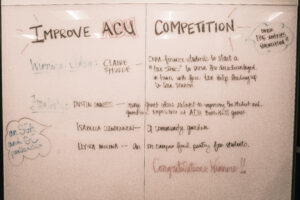
Shudde gave credit where credit is due for the idea. “I got the idea from a friend who attends St. Mary’s University in San Antonio. Their school is situated in an impoverished part of town and the students intentionally work on reaching out and ministering to the community. As a Christian school, I think ACU could follow suit and reach out to the community in this way. There is potential for this to be an incredible ministry in Abilene, and while accounting/finance majors help people with money, other students can minister to the people waiting.”
Claire continued, “I think the best way to establish this would be to partner with ministries like Love and Care or the Mission that are currently working and established. As a senior chemistry major, I am fairly far removed from accounting and finance, so I doubt I could be involved in the actual functioning of the tax clinic. Rather than be hands on myself, I would love to brainstorm with those who are knowledgeable in this area and will be in Abilene longer than me.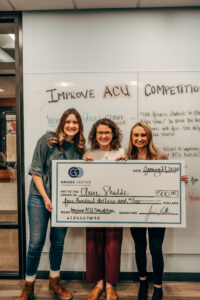 I think breaking the ACU bubble in this way will benefit both the community and the ACU students involved. My hope and prayer is that through simple actions such as helping a single mom file for a tax return, people can experience the love of God. Isaiah 1:17 says ‘Learn to do good, seek justice, correct oppression, bring justice to the fatherless, take up the case of the widow.’ While setting up a tax clinic does not fix all the problems in Abilene, I think it would be a chance for christians to live out this charge. I hope that in a few years I can look back and see ACU taking steps into the community beyond just a tax clinic.”
I think breaking the ACU bubble in this way will benefit both the community and the ACU students involved. My hope and prayer is that through simple actions such as helping a single mom file for a tax return, people can experience the love of God. Isaiah 1:17 says ‘Learn to do good, seek justice, correct oppression, bring justice to the fatherless, take up the case of the widow.’ While setting up a tax clinic does not fix all the problems in Abilene, I think it would be a chance for christians to live out this charge. I hope that in a few years I can look back and see ACU taking steps into the community beyond just a tax clinic.”
The ACU community often talks about the “ACU Difference”. Bright minded students who have a passion not only for ACU, but for making ACU and Abilene a greater place, are living, breathing examples of that difference. Congratulations to Claire Shudde on winning the competition! Want to learn more about the Griggs Center for Entrepreneurship and Philanthropy and how you can get involved? Click here to learn more.
by Katherine Norris | Feb 13, 2020 | Academics, COBA Faculty, COBA Staff, Faith Infusion, Special Speakers
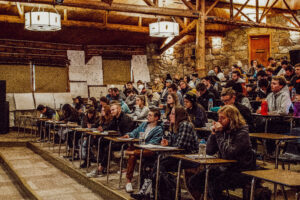
Leadership Summit 2020
Leadership Summit 2020 is complete and the students have cleared out and come back to ACU with jaws wide open and a new mindset. This year I (Katie Norris ’22) joined my fellow classmates in experiencing Leadership Summit at Frontier Ranch in Buena Vista, CO in early January. If you don’t know much about Summit, the most important thing to know is that it is a challenging process that pushes you to do the things you are passionate about but haven’t had the courage or tools to step up and do yet. We call this our “River Crossing” on the mountain. Luckily, we didn’t have to cross any actual rivers in the rather icy weather.
My purpose in writing this blog is to recap the trip and give a student insight as to what happens on the mountain that leads so many people to come away from Leadership Summit with a new perspective and motivation.
A typical day at Summit would begin at 8:00 am and end about 9:00 pm with a nice two hour break in the middle of the day. Students spent the time participating in case studies, listening to speaker sessions, interactive breakout sessions, small group processing time, worship, and various activities like archery tag, taking hikes, and the Screamer (picture attached).

The Screamer
What’s beautiful about Leadership Summit is that it is all about utilizing your leadership potential (whether that be a role as a leader in your organization or something as simple as being a son or daughter) and being a servant to the communities you are a part, for their betterment. Not only were we given a charge from Dr. Dennis Marquardt and Dr. Rick Lytle to make an impact using our leadership roles, but we were given astonishing examples of people who have done so themselves and who gave us tools to succeed in our own visions.
This is done through the testimonies of distinguished guest speakers. We spent much of our time listening to accomplished people from different backgrounds speak on a variety of topics. This year, we were blessed with the opportunity to hear Mo Isom Aiken (New York Times best-selling author), April and Mark Anthony (founders of Encompass Home Health and Homecare Homebase ), Kathy Crockett (professor and consultant), Wendy Davidson (President of Away From Home, Kellogg Company), Elise Mitchell (Entrepreneur, CEO, consultant, and executive coach), Carlos Sepulveda (Chairman of Triumph Bancorp, Inc.), Rick Atchley (preaching minister at the Hills Church of Christ), Tim Goeglein (Vice President for External and Government Relations at Focus on the Family in Washington), David Eaton (founder of Axis), Stephen Quinn (Chief Marketing Officer of the CEO Forum), Janeen Uzzell (Global Technology Executive at Wikimedia), and Mike Willoughby (Chief Executive Officer at PFSweb). To show our thanks for the words spoken over us, we sang “The Lord Bless You and Keep You” over each speaker after their session. On top of all of this, one of the perks of Leadership Summit was also the opportunity to sit with these speakers at meals, get to know them, and ask them questions.
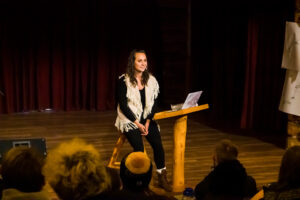
Mo Isom Aiken
Each and every River Crossing project was uniquely crafted based off of each individual student’s passions, life journey, and values. In order to bring us to a place where we could recognize each of those factors, we completed assignments before our week on the mountain that allowed us to consider what we truly value based on how we spend our time. We also were asked to write down major points in our life that shape our perspective and what we are passionate about in something called a “Journey Line”. I had no preexisting expectations of what Summit would be like and found some assignments to be what I thought was simple busywork. Dr. Marquardt quickly challenged that idea when we worked through our values session. He presented a statement based off of that assignment that gave the realization that we may not always value what we say we value over other things that we choose to make time for. This made everyone in the room rethink how they spend their time day to day, to think about what they truly value, and what they need to value more.
One really unique experience came from completing a “Journey Line” that showed the points in our life that we felt like were pivotal moments in a “highs and lows” sort of fashion. At the beginning of the week, we were asked to write this “Journey Line” on a giant paper that we hung on the walls where they remained for the week. This was a neat experience as we got to walk around the room during free times and read our peers’ journey lines. In my observations, it gave us a mindset of understanding and an excitement to dig deeper with each other throughout the week.
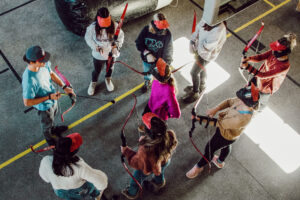
Archery Tag
We were continually astonished by the relevant and practical speaker sessions that were faith focused. Speaking for everyone at Summit, I can say it was refreshing to hear people boldly talk about the true and hard things in life. As students, we were especially grateful to hear professionals speak more into life than business plans and profit maximization.
Over the course of the week we participated in activities that grew our friendships, relationships, faith, knowledge, and inspiration to do great things. To close out the week-a graduation ceremony. Not quite what you would expect from a business short course. Maybe that’s why we students found it so impactful. God seems to work even on the mountains in life.
by Katherine Norris | Feb 7, 2020 | Academics, COBA Faculty, Current Students, Financial Management, Research, Uncategorized
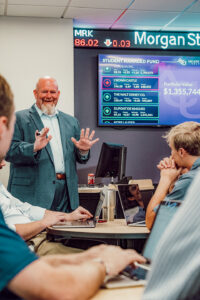
Jody Jones mentoring the STAR Fund Managers
Do you know about everything that goes on in COBA? We have so many awesome student programs, that chances are, you may have missed a few! STAR (Student Trading and Research) is a program where students learn to research an investment portfolio and trade assets based off their information. STAR began as an idea in 1999 and with an initial gift by a generous donor of $110,000 in June of 2000, ended its first full year of operation in 2001. Today, STAR manages a portion of ACU’s endowment and reports to the ACIMCO Board annually. STAR began as a student organization guided by Dr. Terry Pope and Dr. Jonathan Stewart. Now, students can earn course credit while they earn valuable real-world experience.
That kind of learning is something that Assistant Professor of Finance Dr. Jody Jones, who began teaching at ACU this past fall, is passionate about. Jones took over the STAR course after Dr. Pope retired last spring. Jones feels that one of the greatest learning opportunities that STAR affords is autonomy to the students in learning to make financial decisions. “All decisions are made by students. Although a faculty member helps guide decisions, the buying and selling of assets is dictated by student managers.”

Since inception, STAR has achieved an average return of nearly 50 basis points above its benchmark: S&P 500
Total Return Index. That’s reason enough to celebrate for any advising firm but this week STAR hit a huge milestone – the portfolio currently holds an outstanding $1.5 million.
Why is that such an important milestone? Dr. Jones explained, “The rising value of STAR allows students to better diversify and have more freedom in investment decisions. With the primary goal of the course being educational, students can buy and sell many assets and gain a broad perspective on the market. Also, this year will make it the first year that STAR has made distributions. The fund will return 4.5% of its value to the endowment to support scholarships, campus initiatives, and operations of the university.”
 While STAR mainly consists of finance majors, anyone who is interested can join and is encouraged to do so. If needed, students can even apply to receive course credit for being a fund manager.
While STAR mainly consists of finance majors, anyone who is interested can join and is encouraged to do so. If needed, students can even apply to receive course credit for being a fund manager.
Dr. Jody Jones loves his profession for more than the numbers. He is passionate about integrating faith into his work and teaching. “While many of the student managers intend to work in the investment and financial services fields after graduation, financial management is important for all organizations and households. Stewardship is also a spiritual discipline.”
 Graham Cepica (’21) is a marketing major from Lubbock, TX. Graham recently began an internship with New York real estate developer, Horacio LeDon, where he has been able to receive real-world experience that he can translate to the classroom and his professional career development. When it comes to internships and job searches, networking often plays a vital role in finding the opportunities that will provide the most valuable experience. Initiative, interest, and passion also play a large role in obtaining such opportunities. Graham is a wonderful example of how networking brought him to a once in a lifetime internship opening.
Graham Cepica (’21) is a marketing major from Lubbock, TX. Graham recently began an internship with New York real estate developer, Horacio LeDon, where he has been able to receive real-world experience that he can translate to the classroom and his professional career development. When it comes to internships and job searches, networking often plays a vital role in finding the opportunities that will provide the most valuable experience. Initiative, interest, and passion also play a large role in obtaining such opportunities. Graham is a wonderful example of how networking brought him to a once in a lifetime internship opening.

 Before I studied abroad, I might not have taken seriously how deeply one connects to the place they live. “Yes, they have to come home. So what? They just spent the last two months travelling and spending money. Surely it couldn’t have made that big of an impact, right?” And sadly, I make these assumptions for many activities I have no experience in. Yet, the past two months, while seemingly short, truly were life changing, and my heart ached at the prospect of leaving early and departing from that environment.
Before I studied abroad, I might not have taken seriously how deeply one connects to the place they live. “Yes, they have to come home. So what? They just spent the last two months travelling and spending money. Surely it couldn’t have made that big of an impact, right?” And sadly, I make these assumptions for many activities I have no experience in. Yet, the past two months, while seemingly short, truly were life changing, and my heart ached at the prospect of leaving early and departing from that environment. The day we left for Oxford – a Wednesday morning after spring semester had started – we were teary-eyed and unsure what the next four months held. I had two close friends going abroad with me and others who I hoped to know better, but I was leaving many dear friends at ACU. ‘Why on earth am I leaving when I have so many good things right here?’ I thought as we all hugged each other goodbye. Then, we were whisked away on the bus, took several long flights, and arrived exhausted and unsure the next day in the city of Oxford. It was cloudy, cold, and completely foreign.
The day we left for Oxford – a Wednesday morning after spring semester had started – we were teary-eyed and unsure what the next four months held. I had two close friends going abroad with me and others who I hoped to know better, but I was leaving many dear friends at ACU. ‘Why on earth am I leaving when I have so many good things right here?’ I thought as we all hugged each other goodbye. Then, we were whisked away on the bus, took several long flights, and arrived exhausted and unsure the next day in the city of Oxford. It was cloudy, cold, and completely foreign. While a foreign country itself is an incredible journey, it wouldn’t have been half of what it was without the people I experienced it with. Oxford holds the largest ACU group, with thirty-five students, two professors, and an on-site director, but it never hindered us from learning to know one another. These were people we saw day in, day out, from breakfast to class, to the common rooms and everywhere in between. We were all on the same schedule, all in a new place, and all wanting to make the most of our time here – which is the perfect environment for connection. Not only did I grow closer to the friends I already had, but our community grew abundantly as we created one-of-a-kind shared experiences with each other. Class devotionals on Monday nights, breakfast for dinner with a smaller group, college night at church (and going for ice cream once it ended), and eventually, travelling to different countries in our free weekends. An environment affect change so much in a person, but the people there with you make all of the difference.
While a foreign country itself is an incredible journey, it wouldn’t have been half of what it was without the people I experienced it with. Oxford holds the largest ACU group, with thirty-five students, two professors, and an on-site director, but it never hindered us from learning to know one another. These were people we saw day in, day out, from breakfast to class, to the common rooms and everywhere in between. We were all on the same schedule, all in a new place, and all wanting to make the most of our time here – which is the perfect environment for connection. Not only did I grow closer to the friends I already had, but our community grew abundantly as we created one-of-a-kind shared experiences with each other. Class devotionals on Monday nights, breakfast for dinner with a smaller group, college night at church (and going for ice cream once it ended), and eventually, travelling to different countries in our free weekends. An environment affect change so much in a person, but the people there with you make all of the difference. It would be impossible to convey everything I learned or experienced in Oxford, but there are a few that stick out to me. Something I have noticed since being at home is that study abroad gives students the opportunity to step back from their commitments, their activities, the people they spend time with, and really see who they are outside of that. It can help you think about what’s important to you back home, and what you want the rest of your college career to look like. For me, these past two months helped me grow in proactivity and confidence. Whether it be volunteering to plan out all the details of our next trip, using Apple maps to navigate us through the streets of a city, or choosing excitement instead of intimidation when countless opportunities present themselves, the experiences I had helped make me a little more well-rounded (I hope, at least!).
It would be impossible to convey everything I learned or experienced in Oxford, but there are a few that stick out to me. Something I have noticed since being at home is that study abroad gives students the opportunity to step back from their commitments, their activities, the people they spend time with, and really see who they are outside of that. It can help you think about what’s important to you back home, and what you want the rest of your college career to look like. For me, these past two months helped me grow in proactivity and confidence. Whether it be volunteering to plan out all the details of our next trip, using Apple maps to navigate us through the streets of a city, or choosing excitement instead of intimidation when countless opportunities present themselves, the experiences I had helped make me a little more well-rounded (I hope, at least!). place. As we packed and prepared to leave for it, we heard about more and more programs that were being called back home and that the numbers of the sick in Italy were growing exponentially. There was debate if we would be pulled, too, but the ACU Study Abroad office continually communicated with us that our program would continue as planned, as long as our area was safe and that the US deemed it so. Looking back, our time all together in Spain was one of the high points of our semester, and we could not have ended on a better note.
place. As we packed and prepared to leave for it, we heard about more and more programs that were being called back home and that the numbers of the sick in Italy were growing exponentially. There was debate if we would be pulled, too, but the ACU Study Abroad office continually communicated with us that our program would continue as planned, as long as our area was safe and that the US deemed it so. Looking back, our time all together in Spain was one of the high points of our semester, and we could not have ended on a better note. As I sit here at home, saddened by what these next two months could have held in Oxford, but even more so by the devastation and chaos that the Coronavirus has brought upon everyone, I am still grateful. Friends and family reaching out to see how we are holding up, class Zoom calls that feel a little more like reunions, a virtual breakfast for dinner, and time to sit and dwell on what the Lord has done in us since we left the US back in January. Study Abroad gave me the dearest friends, an abundant atmosphere and culture, and instilled a drive in me to go after and get done ideas that I have. I am so incredibly grateful for this opportunity, in the midst of its interruption, and I am curious to see what the rest of this year will look like. Still, I am eager for the day when I can return again to visit this temporary home.
As I sit here at home, saddened by what these next two months could have held in Oxford, but even more so by the devastation and chaos that the Coronavirus has brought upon everyone, I am still grateful. Friends and family reaching out to see how we are holding up, class Zoom calls that feel a little more like reunions, a virtual breakfast for dinner, and time to sit and dwell on what the Lord has done in us since we left the US back in January. Study Abroad gave me the dearest friends, an abundant atmosphere and culture, and instilled a drive in me to go after and get done ideas that I have. I am so incredibly grateful for this opportunity, in the midst of its interruption, and I am curious to see what the rest of this year will look like. Still, I am eager for the day when I can return again to visit this temporary home.
 gave his seal of approval. “I really enjoyed the class. This past summer, during my internship at EY, I was selected as 1 of 60 interns nationwide to go to Hoboken, New Jersey to attend a training in auditing analytics. The software packages we were taught in training were Tableau and Alteryx. One of the things I took from the training was how much technology can impact an audit for the better. Also, as 1 of only 60 interns, I would have an advantage over some of my peers. The Audit Analytics course at ACU touched on some of those same topics- specifically Tableau. As the course went along, I realized that we were learning much of the same material Ernst & Young (EY) had deemed a worthy investment. From my short experience in New Jersey, I saw how technology will begin impacting how audits work. Clearly, if EY invested as much money as they did to develop their Digital Ambassador Intern Program, it seems as though the Big 4 accounting firms want to get a head start on this trend. It is really awesome that COBA and Dr. Clements have begun offering this course to ACU students. Our careers will only get more and more digital, so it’s great that ACU is offering this course to help set its students apart from the competition.”
gave his seal of approval. “I really enjoyed the class. This past summer, during my internship at EY, I was selected as 1 of 60 interns nationwide to go to Hoboken, New Jersey to attend a training in auditing analytics. The software packages we were taught in training were Tableau and Alteryx. One of the things I took from the training was how much technology can impact an audit for the better. Also, as 1 of only 60 interns, I would have an advantage over some of my peers. The Audit Analytics course at ACU touched on some of those same topics- specifically Tableau. As the course went along, I realized that we were learning much of the same material Ernst & Young (EY) had deemed a worthy investment. From my short experience in New Jersey, I saw how technology will begin impacting how audits work. Clearly, if EY invested as much money as they did to develop their Digital Ambassador Intern Program, it seems as though the Big 4 accounting firms want to get a head start on this trend. It is really awesome that COBA and Dr. Clements have begun offering this course to ACU students. Our careers will only get more and more digital, so it’s great that ACU is offering this course to help set its students apart from the competition.”








 While STAR mainly consists of finance majors, anyone who is interested can join and is encouraged to do so. If needed, students can even apply to receive course credit for being a fund manager.
While STAR mainly consists of finance majors, anyone who is interested can join and is encouraged to do so. If needed, students can even apply to receive course credit for being a fund manager.